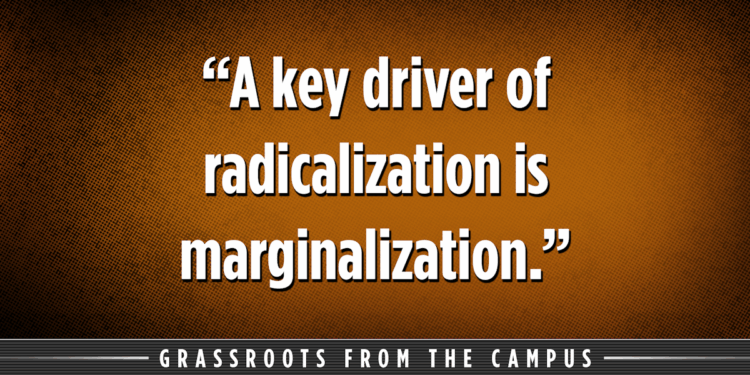Readers of The Patriot Post who have followed my work over the past year and a half know that I am no stranger to holding firm, sometimes unpopular positions within the conservative mainstream. I have talked bluntly but tactfully about the cultural and social roots of group disparities in incarceration and academic achievement. I have called for huge cuts to legal immigration. And I have called out the neoconservative takeover of the American Right.
While I have found a home here, vigorously expressing my views has earned me a level of infamy at Northwestern University.
Just last spring, I received accusations of holding “very, very problematic” views “rooted in racist ideals” on affirmative action during a debate with Northwestern’s College Democrats. That characterization is paradoxical: While progressive students invest considerable energy denouncing my heterodox positions, they remain entirely oblivious to the proliferation of genuine extremism and bigotry in spaces parallel to my own.
My first direct encounter with this radicalism occurred not within my own organization but at a social event hosted with a separate conservative group on campus. I overheard a conversation amongst several men ostensibly concerned with the racial purity of marriages. But as the conversation progressed, their anxieties evolved long past the old racist hobbyhorse of black-white unions; they had moved on to litigating the permissibility of intermarriage between Poles and Swedes as if love required a blessing from the ghost of a Gestapo official.
I finally asked, “Why do you care so much if a white man marries a black woman? Why shouldn’t a Pole marry a Swede?”
They could offer nothing resembling a coherent answer — just a jumble of half-formed phrases and circular justifications that collapsed under the weight of their own absurdity.
Later that same academic quarter, I stayed late into a meeting of this same student group. At this point, there were no freshmen, and only the core members of the organization (plus me) were present. This was when the masks came off and the hoods were put on. Pornography? The Jews’ fault. IQ tests? Doctored by Jews as a power play. The Titanic’s sinking? A Jewish plot to establish the Federal Reserve.
Most horrifically, one of these members said that Jews should not live in the United States and Europe and that Israel should not exist either. With most Jews living in either Europe, the United States, or Israel, it became clear to me that this person was not actually hung up on where Jews lived but why they were alive in the first place. Once again, I tried to argue with them that their views were irrational and indefensible, but nothing I said could get them to reevaluate their positions.
Upon reflection, I came to a troubling realization: The rise in neo-Nazi ideology and beliefs was not merely a figment of the left-wing imagination but a reality unfolding around me. I was shaken. I run Northwestern’s Young Americans for Freedom chapter. Am I part of the problem?
The answer is No.
But to the typical college liberal, the answer is Yes. They think that by platforming conservatives at Northwestern and articulating my views in the school newspaper and elsewhere, I am promoting hate and am responsible for the spread of it against others. This belief that high-profile conservatives are spokespersons of bigotry and bear responsibility for the truly hateful views of others was on full display following Charlie Kirk’s death.
In the aftermath of Kirk’s assassination, Ezra Klein wrote a well-reasoned and highly respectable New York Times column praising Kirk’s political and social project. This sent his readers and other notable leftists into a fury. In the comment thread of his essay were the following:
-
“Appreciate the calming of the waters Ezra … and yet, I find it naive to think that his rhetoric was not escalationist and violent unto itself. He encouraged violence too in his own language and rhetoric.”
-
“Klein’s lionization of Kirk waters down the latter’s anti-American, hateful, violence-inducing platform and attempts to repaint the late Kirk as some vaguely controversial but bold activist.”
Ta-Nehisi Coates had this to say:
More than a century and a half ago, this country ignored the explicit words of men who sought to raise an empire of slavery. It subsequently transformed those men into gallant knights who sought only to preserve their beloved Camelot. There was a fatigue, in certain quarters, with Reconstruction — which is to say, multiracial democracy — and a desire for reunion, to make America great again. Thus, in the late 19th century and much of the 20th, this country’s most storied intellectuals transfigured hate-mongers into heroes and ignored their words — just as, right now, some are ignoring Kirk’s.
While it is easy to cast aside the comments made by angry white liberals and a man whose most intimate experience with American racism occurred when his young son, blocking an escalator, was pushed by a white woman, these comments are reflective of what I believe is a fundamentally incorrect explanation for radicalization.
From my experience over the past three years at university and witnessing some peers be seduced to extremes by David Duke’s acolytes, a key driver of radicalization is marginalization.
To have been a young white man living in the United States for the past decade means having been constantly denigrated by the Leftmedia, teachers, and peers. No matter the hardships a white person faces, their white privilege renders their grievances secondary or even tertiary to the irrational anxieties of cable news anchors and college professors with six-figure paychecks who happen to be darker than the “evil colonists” they never tire of condemning.
At the same time, these young men encounter, through daily life, the news, and social media, examples of antisocial behavior within segments of the black community that seem inconsistent with the totalizing explanations offered by progressive discourse. This dissonance between prevailing social orthodoxy and day-to-day observations leads white adolescents to ask sincere yet provocative questions. Namely, how does racism explain the fact that black men are significantly more likely than white men to commit homicide? In today’s discourse, these observations and questions are not treated as inquiry but instead as a confession of guilt, punishable by permanent exile to the margins.
But it isn’t only liberals who push young conservatives to the margins. The same dynamic exists within our own ranks. The very institutions that claim to represent us — the think tanks, the publications, the student groups — often treat their own grassroots as an embarrassment to be managed rather than a movement to be developed.
Political identity depends on community, on finding a space where one’s views are acknowledged and speech is permitted. When a young conservative touches a taboo topic and encounters condemnation instead of engagement, he hears a simple message: You don’t belong here. Deprived of a framework to process his questions, he concludes that this movement is not his home. And so he goes looking for one that is. In search of belonging, he turns to groups that advertise themselves as more open, more honest, and more willing to “say what others won’t.”
Yet entry into such circles rarely results in liberation. Within communities that harbor or tolerate extremism, acquiring social capital is contingent on conforming to increasingly radical positions. Acceptance is conditional on transgression. Members compete to demonstrate ideological commitment through ever more provocative statements, and what begins as mere contrarianism evolves into a system of escalating radical performance.
The recent Politico exposé of leaked Young Republican chats illustrates this process. These were not fringe agitators but participants within a mainstream political organization. Their private messages revealed a culture in which racist, anti-Semitic, and violent rhetoric functioned as a form of in-group bonding. It is more likely than not that some of the offenders in the chat were not true believers in the poison being spewed.
As Mark Alexander notes, some were just “mired in adolescence.” In these environments, saying radical things is a juvenile adaptive behavior. The quest for belonging ensures that those at the margins of extremism are drawn further toward them, turning contrarian instincts into hateful behaviors.
Wanting to disavow extremism is necessary; turning that disavowal into exclusion is where the process begins to fail. There are, of course, individuals whose convictions are genuinely racist, anti-Semitic, or irredeemably conspiratorial. Such ideas cannot be accommodated in a movement that seeks intellectual and moral legitimacy. But they can, and must, be confronted rather than merely cast out.
Many young conservatives who flirt with radical ideas are not hardened ideologues but disoriented participants searching for meaning, belonging, or moral clarity. The final push they need to fall into the orbit of figures like Nick Fuentes often comes not from persuasion but from ostracism by those who might otherwise have guided them back.
To prevent that descent, the proper response is not silence or moral panic but engagement — guidance, argument, and empathy. This is where Charlie Kirk’s example becomes instructive. Ta-Nehisi Coates accused him of spreading hate, but the reality was the opposite. Kirk had seen hate firsthand. At campus events, he was confronted by young men who denounced him for platforming gay speakers or claimed that “Jewish ventriloquists” were “pulling his strings.” These were encounters with the currents of extremism that thrive when alienation goes unaddressed.
Rather than dismissing or shaming them, Kirk engaged directly — firmly, but patiently. He understood that ridicule and exclusion only confirmed the extremists’ narrative of persecution. Listening even to the intolerant did not mean legitimizing their beliefs; it meant denying them the satisfaction of martyrdom. His approach embodied a difficult but necessary principle: One cannot defeat radicalization by pretending it isn’t there, nor by pushing its sympathizers into the shadows where it flourishes.
Conservatives and liberals must learn this lesson. Otherwise, the spaces where young people gather will sound a lot more like the ones I once walked out of.

















